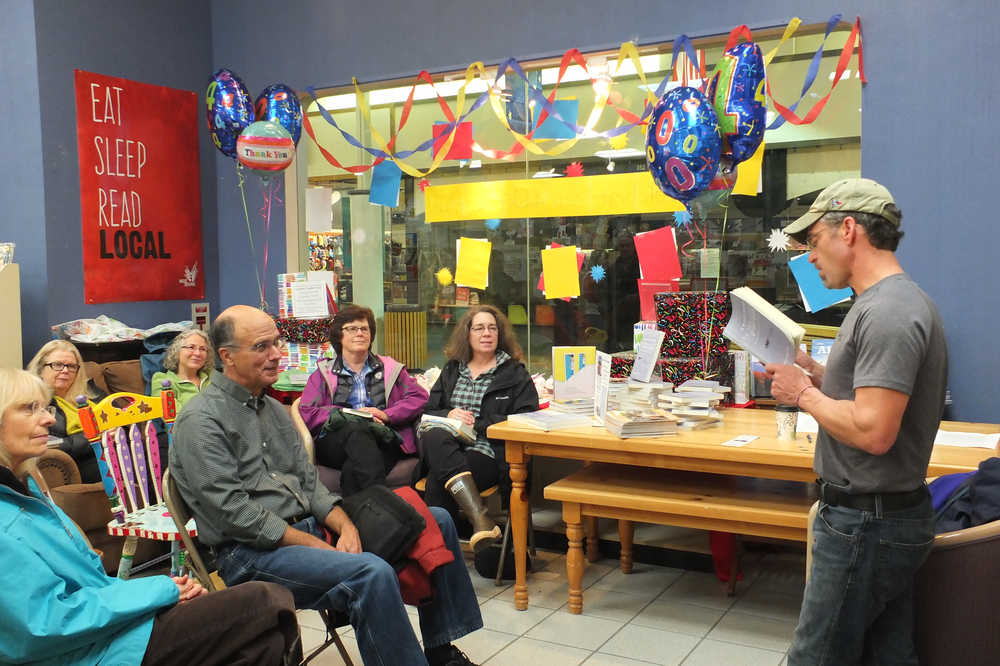The written word doesn’t come easily to acclaimed Alaska writer Seth Kantner. For one, he’s dyslexic, something he recently spoke about in Haines.
“I do have just really huge barriers – dyslexia, physical jumpiness, maybe ADD, I don’t know — I have huge barriers between me, my mind and the page… I don’t really want to admit it, but I have a heck of a time actually writing,” he said. “I like being outside. I like almost constant physical activity…. Writing is really hard and really frustrating; I don’t do it near as much as people think I do.”
The attendees at a Saturday reading in Juneau appeared grateful that he does.
Kantner was in Juneau reading from his newly released book, a collection of writings called “Swallowed by the Great Land: And Other Dispatches from Alaska’s Frontier.”
Kantner grew up in a sod igloo in Alaska’s Arctic. His first published book was a novel based in part on his own life, “Ordinary Wolves.” He’s also published “Shopping for Porcupine,” a kids’ book called “Pup and Pokey,” and has two new books in the works. One is a young adult novel currently called “Wolverine School”; the other is nonfiction about caribou and is called “A Thousand Trails Home.”
Though he’s known for both genres, fiction feels both safer and more satisfying to him, Kantner said.
“I think the stress of … getting facts right is fairly tough on me,” he said. “So I feel like I might head more and more towards fiction.”
Counterintuitively, it’s also easier to get at deeper truths in fiction, he said.
“Definitely, ‘Ordinary Wolves,’ I had to tell it as fiction so I could tell the truth,” he said.
For both genres, what Kantner loves is being outside, gathering stories.
He spends spring and fall at the sod house he grew up in along the Kobuk River, commercial fishes out of Kotzebue in the summer, and “roams around” in the winter.
He wrote “Swallowed by the Great Land” over the course of six or seven years as columns for the then-Anchorage Daily News, and an every-two-week dispatch to Orion Magazine about climate change.
“I write in a void a lot where I don’t know if anybody’s reading my stuff,” he said. “I assume everybody hates me and doesn’t like it.”
When he traveled to Anchorage and other places, though, people asked him if he was going to put the stories in a book.
“The fans are the reason I did this book,” he said. “There’s no other reason. People asked me to do it…. But I like the book. It came out good. And I don’t usually say that.”
This writer likes it, too — “Swallowed by the Great Land” is an insightful, moving collection of glimpses into the Alaskan Arctic, its land, its life, and its changes. In “Wolf Eyes,” for example, Kantner juxtaposes the plastic step-counters his daughter and her friend find in two boxes of Rice Krispies with a broken-legged wolf limping along a riverbank. In “Tinniks,” he writes of his simultaneous loneliness and hungriness for caribou.
“A strange combination, I know, but what can I say: For some of us tundra offspring, these animals are both meals and lifelong companions,” he wrote.
“I like ironies,” Kanter said while in Juneau. “They grow thick where I’m from. The elders are dying off, and each person that goes is a huge loss to the region and culture, but also a huge loss to the ironic-ness of life there.”
At the end of September, Kantner visited Palmer, Anchorage, Talkeetna, Juneau and Haines; in early October he’s visiting Seattle, Portland, Port Angeles, Spokane, Moscow (Idaho) and Missoula. It’s not yet finalized, but in November he may visit other Southeast communities as part of the tour for his new book, he said.
“I never think of myself as a writer,” he said. “Certainly the only thing that got anything written for me was just being a wolverine, and never giving up on the trail forward… Food and being out in the country is the center of my life, and writing is sort of just my payment to the land, and my version of patriotism, I guess.”
• Contact CCW staff writer Mary Catharine Martin at maryc.martin@capweek.com.

